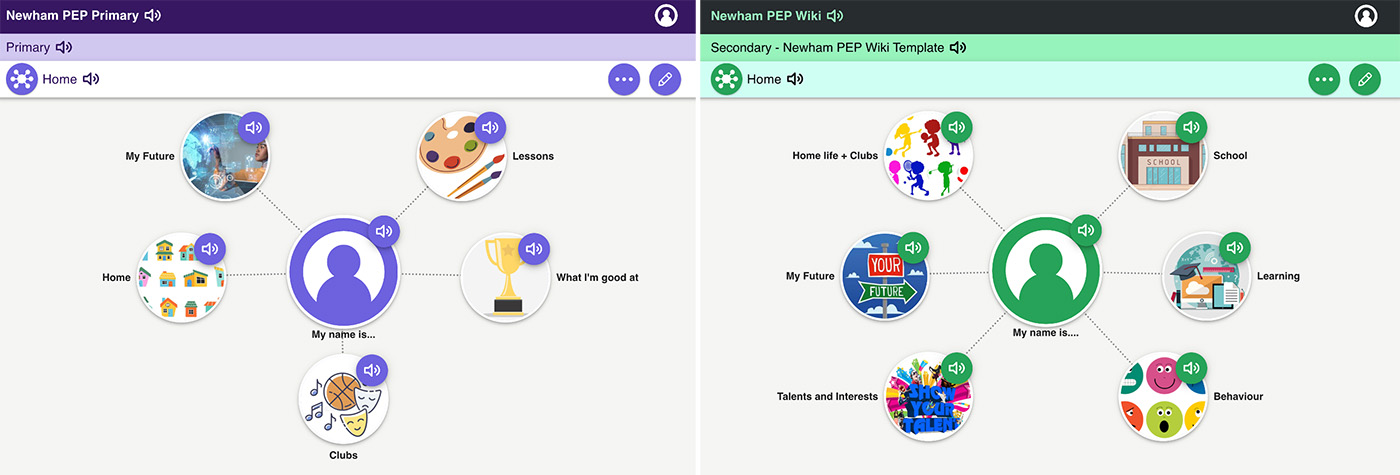Rix Inclusive Research has completed an exciting project in partnership with Local Authority Virtual Schools in Medway and Newham.
In England, every child in care is required to have a Personal Education Plan (PEP). This plan records what is going well in school and what things could be better. It clearly sets out targets and ambitions for the year ahead. The child usually inputs to this plan via a written document, often responding to questions like ‘What is your favourite subject, and why?’
Our project explored how children could answer these same questions, but via a Rix Wiki as an alternative to a written document. In a Wiki, you can respond with voice, words, photos and videos. It’s a fresh way to have your opinions and views heard.
Using multimedia advocacy at personal education planning (PEP) meetings
The project generated lots of responses from the children. They enjoyed using the Wiki as an alternative to written responses. The Wiki provided an accessible way to communicate their successes and challenges.
“I loved the fact that it had all forms of media. I could record my voice. I could take a picture. I could type as well.” – Child
The children expressed how they used emoticons in the Wiki to share their feelings, and that they found that the Wikis helped to communicate and express their emotions in a way that they could relate to.
“They liked the emojis, to add different images to the text.” – Achievement officer

How did professionals react to the Wiki at the PEP meeting?
The project also explored the impact of the Wiki on designated teachers, social workers and other adults at the PEP meeting. The adults told us how much they learned about the child through the Wiki. Gaining a better understanding of the child and their life creates greater understanding, empathy and compassion.
“The adults in the PEP meeting thought it was great and said it was a lovely way to learn all about the children and what they had been doing. They said that it was obvious that this method of completing the consultation had been more motivating for the children and so should be encouraged.” – Designated teacher
A designated teacher explained how well the Wiki captured the voice of the child, because it offered different ways of recording and capturing their feelings and opinions.
“Using technology helps engage the learner and it helps to capture the learner’s voice in a different way.” – Designated teacher
Many of the adults commented on the child’s active engagement and participation in the meeting, enabled by the Wiki. It was great to hear that technology helped to bring the child into the centre of the meeting, which was, of course, all about them!
“I also noticed that this was the most animated these children had ever been for sharing their consultation in a PEP meeting – they were happy and relaxed andlaughed when a page came up with a funny picture or explanation – it was lovely to see!” – Designated teacher
Where next?
The children gave us lots to think about and take away! They have asked for some changes to the software, to personalise their Wiki even more. For example, they would like to be able to create and apply their own background images to the Wiki.
The project also explored how the Wiki initially took a little longer than the written form to complete. However, updating the Wiki, after the initial set up, would take around the same time, as the child would be updating the information rather than starting from scratch.
Want to learn more?
If you work in a Virtual School or with children in care, and would like to learn more about this project, please contact the team at RIX. We can tell you more about RIX Wikis and we can show you how they could transform PEP meetings and supercharge the engagement of children as they take a more active role in planning their future.
About this project
This project was funded by the UEL East London Impact Scholars Award (ELISA).
The project was led by Craig Wilkie with support and guidance provided by Ajay Choksi and Dr. Janet Hoskins.
We have used the term children in care in this article. Some local authorities and organisations may use the term looked after children.

